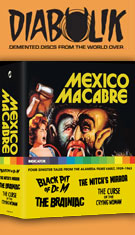
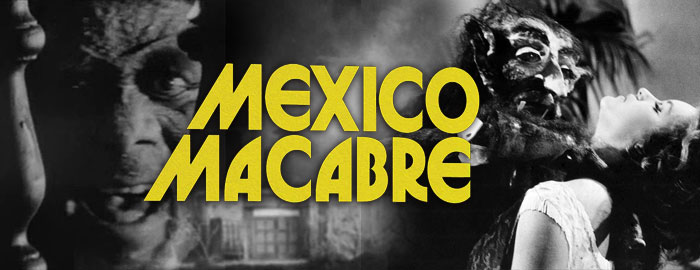


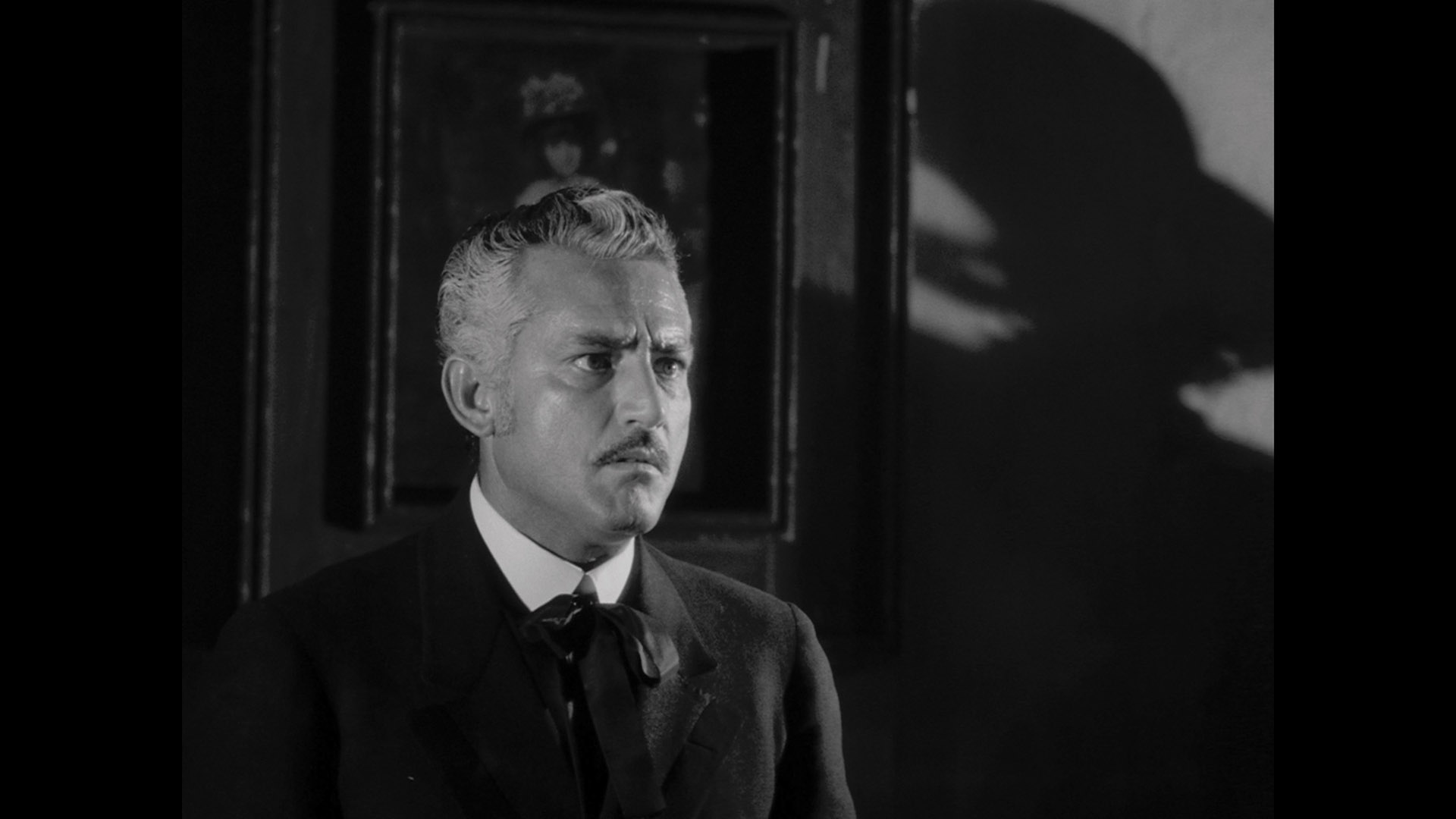 film industry turned out numerous films in every major genre each year going back to the silent era,
film industry turned out numerous films in every major genre each year going back to the silent era, 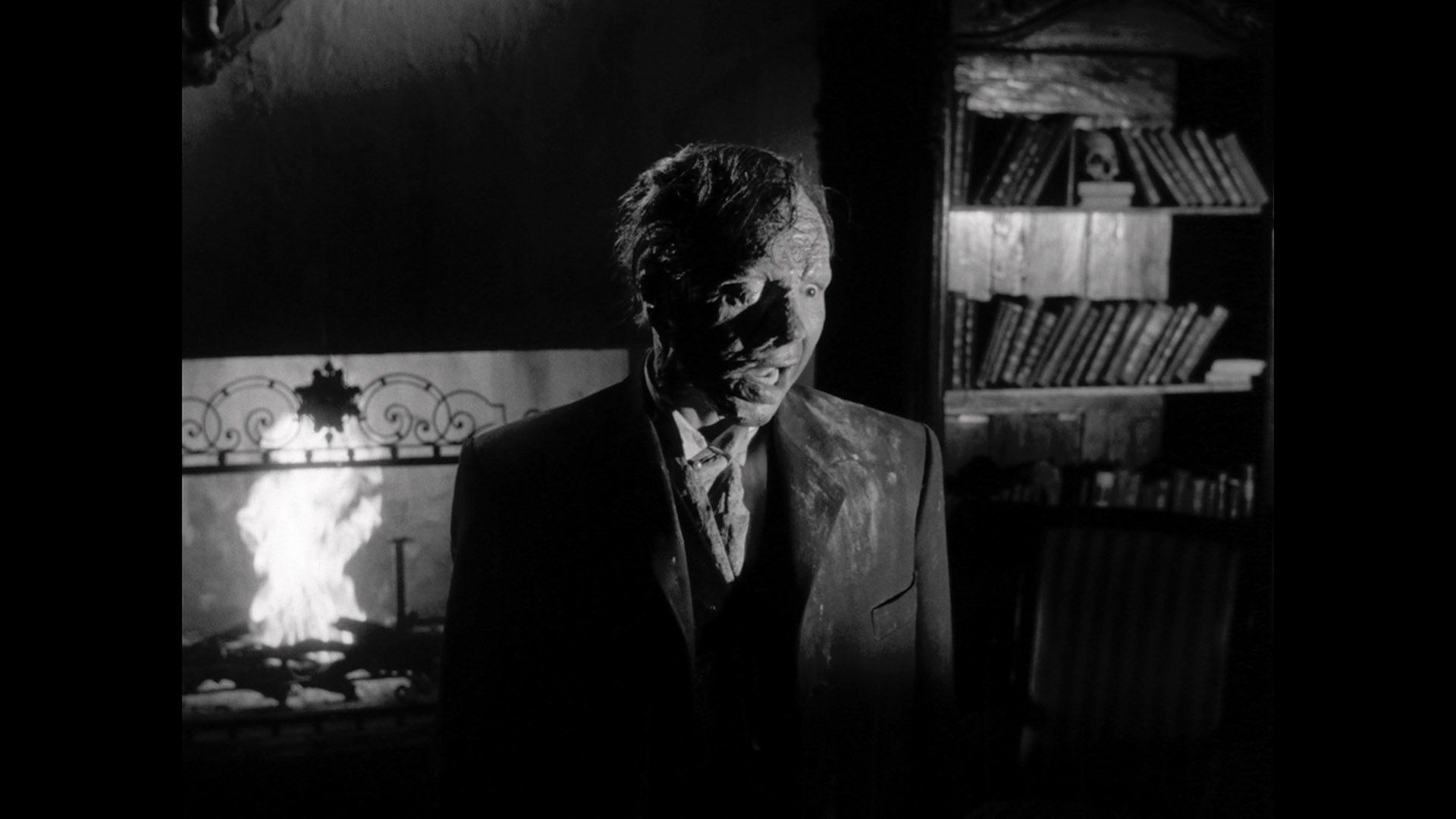 Mexican cinema found an enduring English-friendly audience during the latter half of the '50s for several decades onward with a slew of wild horror and fantasy films. Many of these were dubbed for the U.S. market by distributor K. Gordon Murray (including some astonishing children's musicals), and while Mexican horror soon became synonymous with wrestlers, robots, and bloody apes, it definitely had more artistic Gothic side as well. Several of these titles have become regarded as key works of international genre cinema, and four particularly beloved ones were compiled in 2023 by Indicator for a U.S. and U.K. limited boxed set release, Mexican Macabre: Four Sinister Tales from the Alameda Films Vault, 1959–1963, picking up after its previous forays into 1930s Mexican horror with La Llorona and Phantom of the Monastery. All of these titles were issued previously on DVD in the U.S. in fine special editions from CasaNegra circa 2006, but they're given greatly expanded special editions here including stellar HD restorations.
Mexican cinema found an enduring English-friendly audience during the latter half of the '50s for several decades onward with a slew of wild horror and fantasy films. Many of these were dubbed for the U.S. market by distributor K. Gordon Murray (including some astonishing children's musicals), and while Mexican horror soon became synonymous with wrestlers, robots, and bloody apes, it definitely had more artistic Gothic side as well. Several of these titles have become regarded as key works of international genre cinema, and four particularly beloved ones were compiled in 2023 by Indicator for a U.S. and U.K. limited boxed set release, Mexican Macabre: Four Sinister Tales from the Alameda Films Vault, 1959–1963, picking up after its previous forays into 1930s Mexican horror with La Llorona and Phantom of the Monastery. All of these titles were issued previously on DVD in the U.S. in fine special editions from CasaNegra circa 2006, but they're given greatly expanded special editions here including stellar HD restorations.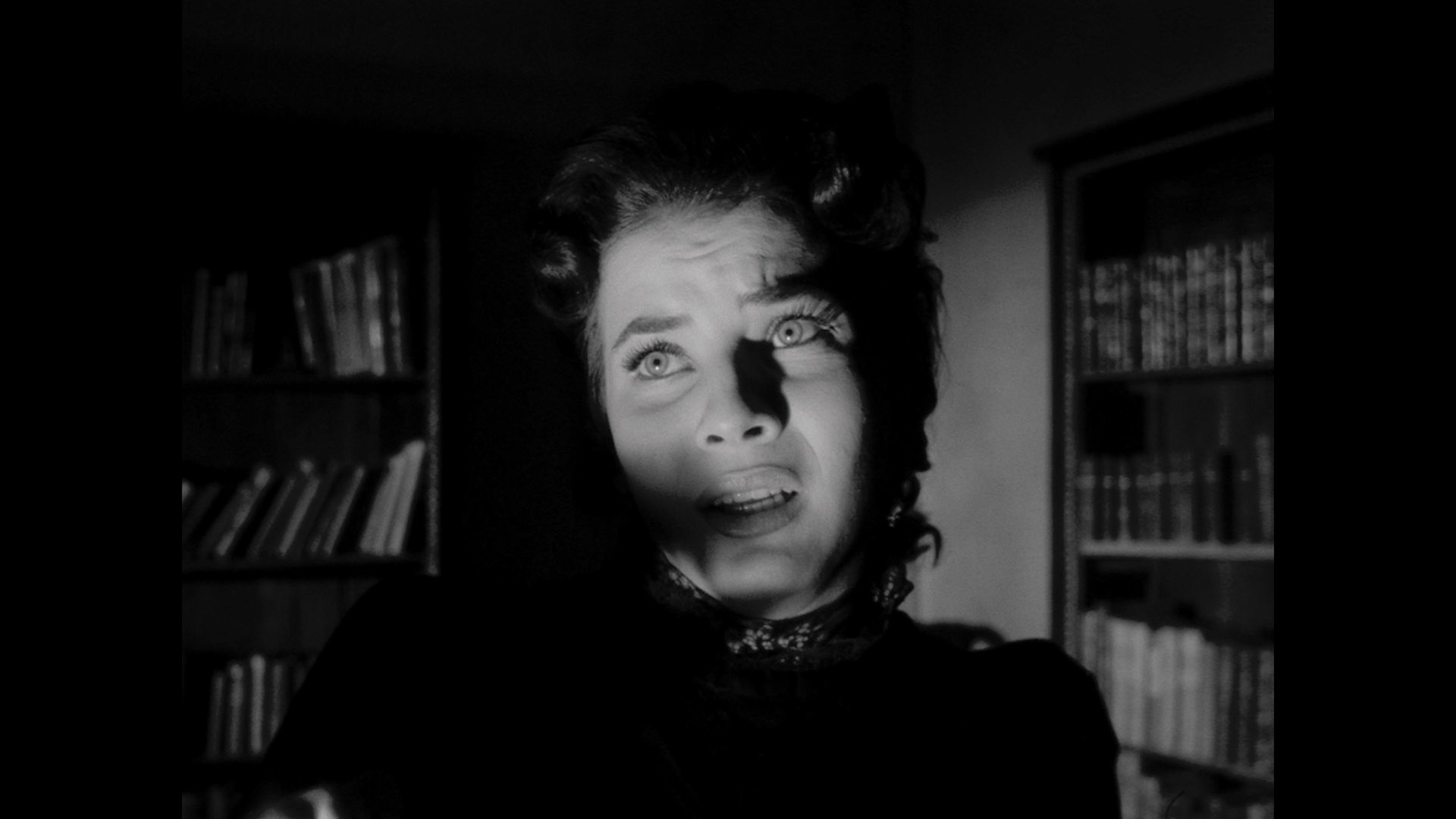 the following year, The Vampire's Coffin (not to mention the less widely seen but marvelously entertaining Ladrón
the following year, The Vampire's Coffin (not to mention the less widely seen but marvelously entertaining Ladrón 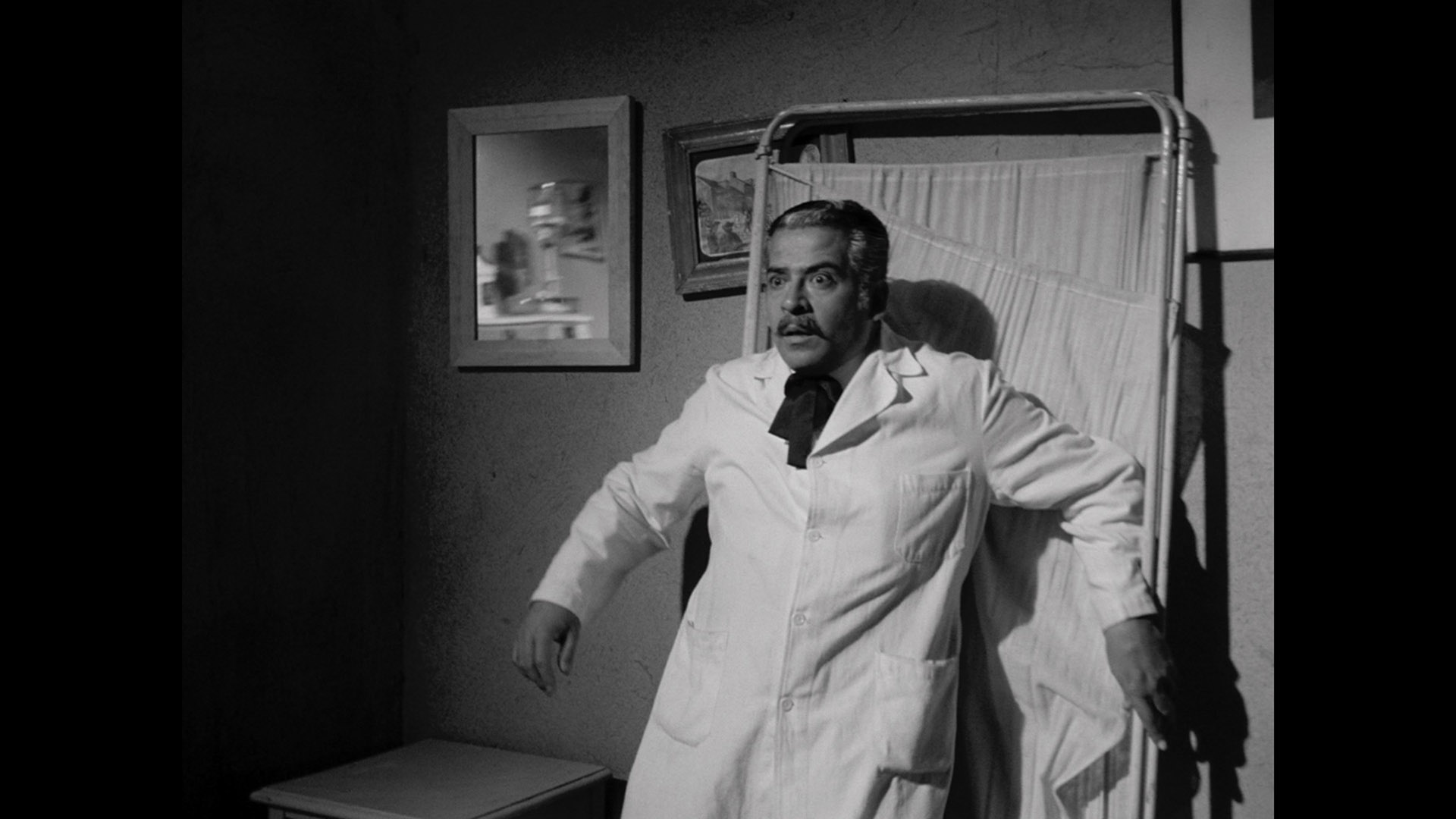 de cadáveres). Our Poe-style story involves a pact at a mental institution between Dr. Mazali (Bertrand) and Dr. Aldama (Raxel) that whichever one dies first will come back and tell the other one all about it. When Aldama passes on soon after, his spirit returns via a séance and lures his long-lost daughter, Patricia (Cortés), to the asylum where she becomes entangled in a maelstrom involving Mazali's obsessive behavior, ill-fated orderly Eduardo (Ancira), murder, and rampaging lunatics. Complete with gruesome facial scarring effects and atmosphere galore, this one makes for a great gateway film if you're watching these in order. All of the actors do a fine job with their roles, and Méndez stages the action with escalating panache that pays off in the last act with a number of memorable scenes including a cracking good rising from the grave sequence. Given a modest U.S. run in 1961 outside of the usual K. Gordon Murray stable, this was one of many early successes from Alameda Films who turned out the lion's share of noteworthy Mexican supernatural horrors that decade.
de cadáveres). Our Poe-style story involves a pact at a mental institution between Dr. Mazali (Bertrand) and Dr. Aldama (Raxel) that whichever one dies first will come back and tell the other one all about it. When Aldama passes on soon after, his spirit returns via a séance and lures his long-lost daughter, Patricia (Cortés), to the asylum where she becomes entangled in a maelstrom involving Mazali's obsessive behavior, ill-fated orderly Eduardo (Ancira), murder, and rampaging lunatics. Complete with gruesome facial scarring effects and atmosphere galore, this one makes for a great gateway film if you're watching these in order. All of the actors do a fine job with their roles, and Méndez stages the action with escalating panache that pays off in the last act with a number of memorable scenes including a cracking good rising from the grave sequence. Given a modest U.S. run in 1961 outside of the usual K. Gordon Murray stable, this was one of many early successes from Alameda Films who turned out the lion's share of noteworthy Mexican supernatural horrors that decade. 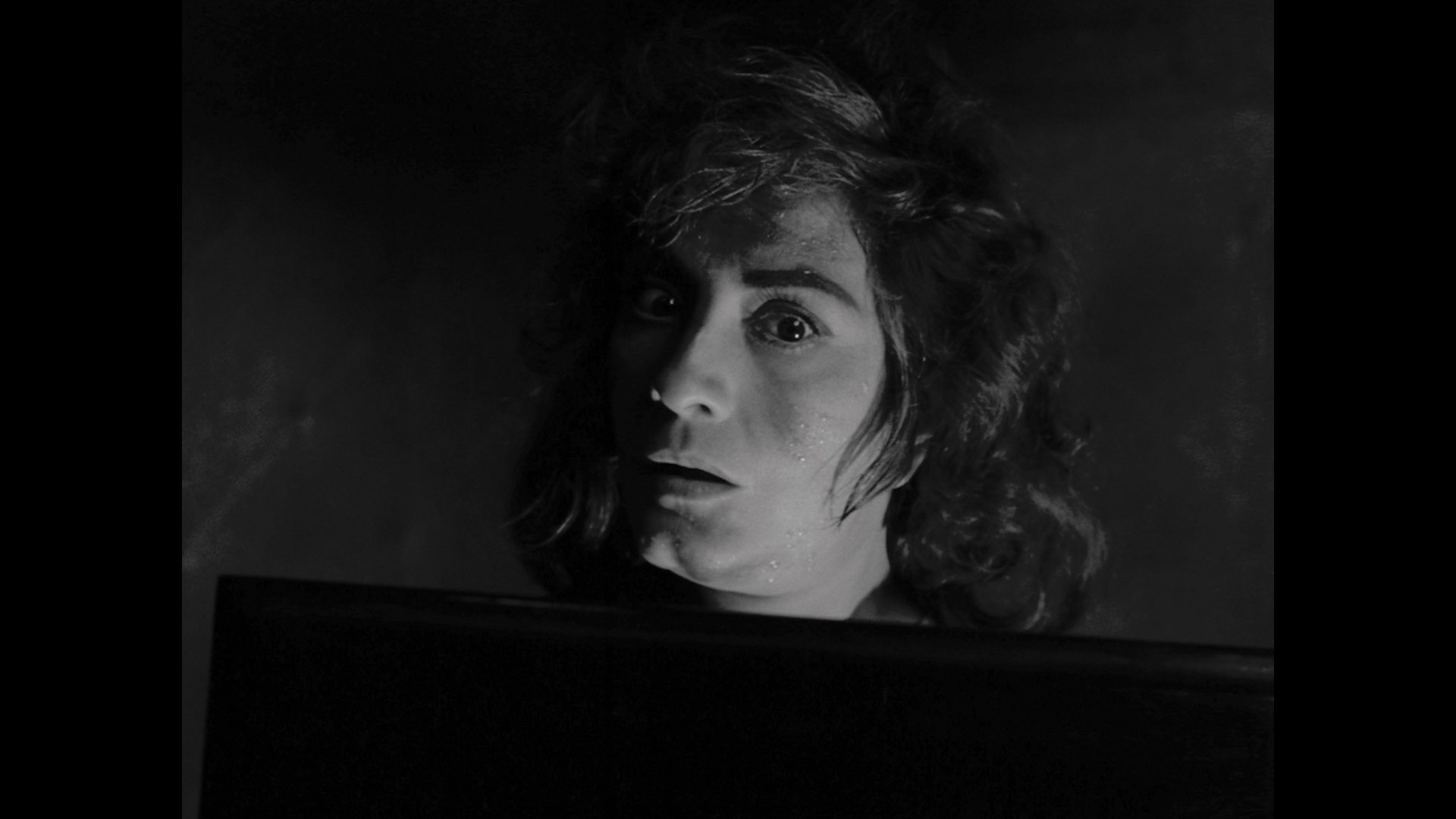 Invade the U.S." by Rob Craig about the K. Gordon Murray cycle, an essay on Fernando Méndez by Mexican film specialist David Wilt, a Gaston Santos bio, a "Back Pit"
Invade the U.S." by Rob Craig about the K. Gordon Murray cycle, an essay on Fernando Méndez by Mexican film specialist David Wilt, a Gaston Santos bio, a "Back Pit" 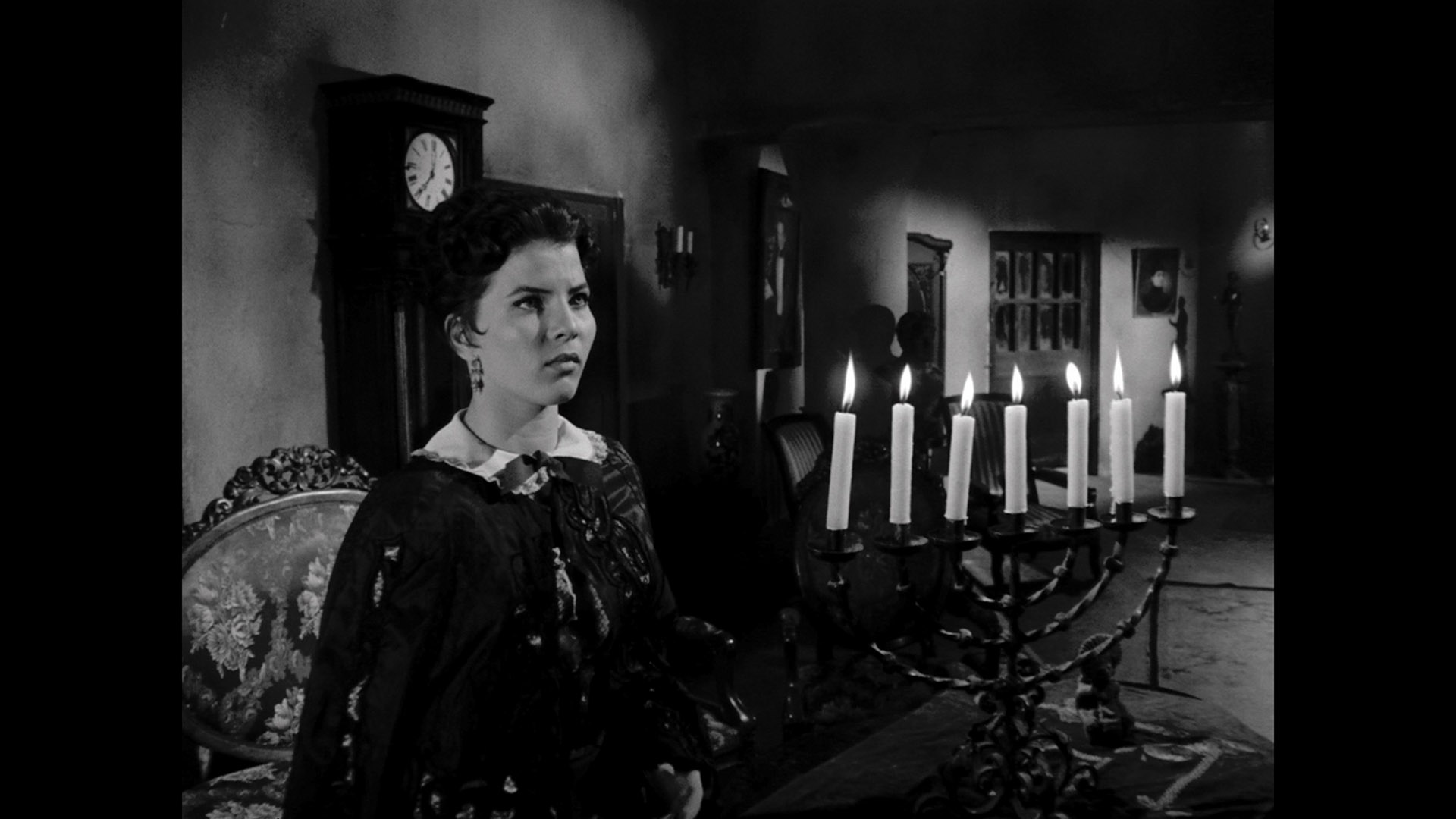 music video by 21st Century Art, the 1961 English continuity script, the Mexican trailer, and a gallery. It's worth noting that a trailer for the (now apparently lost) English-dubbed release of the film can be found on various Something Weird Mexican horror DVDs (along with U.S. TV spots for The Braniac and The Witch's Mirror). The Indicator Blu-ray marks the film's global debut in that format (as with its companion features here), and it looks excellent throughout with deeper blacks than its SD predecessor and finer detail. The LPCM Spanish 1.0 mono track is also in pristine condition and features improved optional English subtitles. Film programmer, curator, and Mexican horror cinema expert Abraham Castillo Flores delivers a very illuminating and informative commentary track about multiple literary inspirations, the creative hands behind the scenes, the mixture of Mexican and European spritism at play here, and tons more. In "Preserving a Legacy" (19m19s), Daniel Birman Ripstein discusses the history of Alameda Films and his close relationship with his grandfather and mentor, producer and company founder Alfredo Ripstein, a major figure in Mexican cinema's golden age. In "Black Pit of Dr. Méndez" (26m2s), Eduardo de la Vega Alfaro, author of Fernando Méndez, 1908–1966, discusses the life and career of the filmmaker including his background in a cinephile family, his time and experiences in the U.S., the relatives who played a role in his career path, and several key films that serve as the foundation of his legacy. Also
music video by 21st Century Art, the 1961 English continuity script, the Mexican trailer, and a gallery. It's worth noting that a trailer for the (now apparently lost) English-dubbed release of the film can be found on various Something Weird Mexican horror DVDs (along with U.S. TV spots for The Braniac and The Witch's Mirror). The Indicator Blu-ray marks the film's global debut in that format (as with its companion features here), and it looks excellent throughout with deeper blacks than its SD predecessor and finer detail. The LPCM Spanish 1.0 mono track is also in pristine condition and features improved optional English subtitles. Film programmer, curator, and Mexican horror cinema expert Abraham Castillo Flores delivers a very illuminating and informative commentary track about multiple literary inspirations, the creative hands behind the scenes, the mixture of Mexican and European spritism at play here, and tons more. In "Preserving a Legacy" (19m19s), Daniel Birman Ripstein discusses the history of Alameda Films and his close relationship with his grandfather and mentor, producer and company founder Alfredo Ripstein, a major figure in Mexican cinema's golden age. In "Black Pit of Dr. Méndez" (26m2s), Eduardo de la Vega Alfaro, author of Fernando Méndez, 1908–1966, discusses the life and career of the filmmaker including his background in a cinephile family, his time and experiences in the U.S., the relatives who played a role in his career path, and several key films that serve as the foundation of his legacy. Also 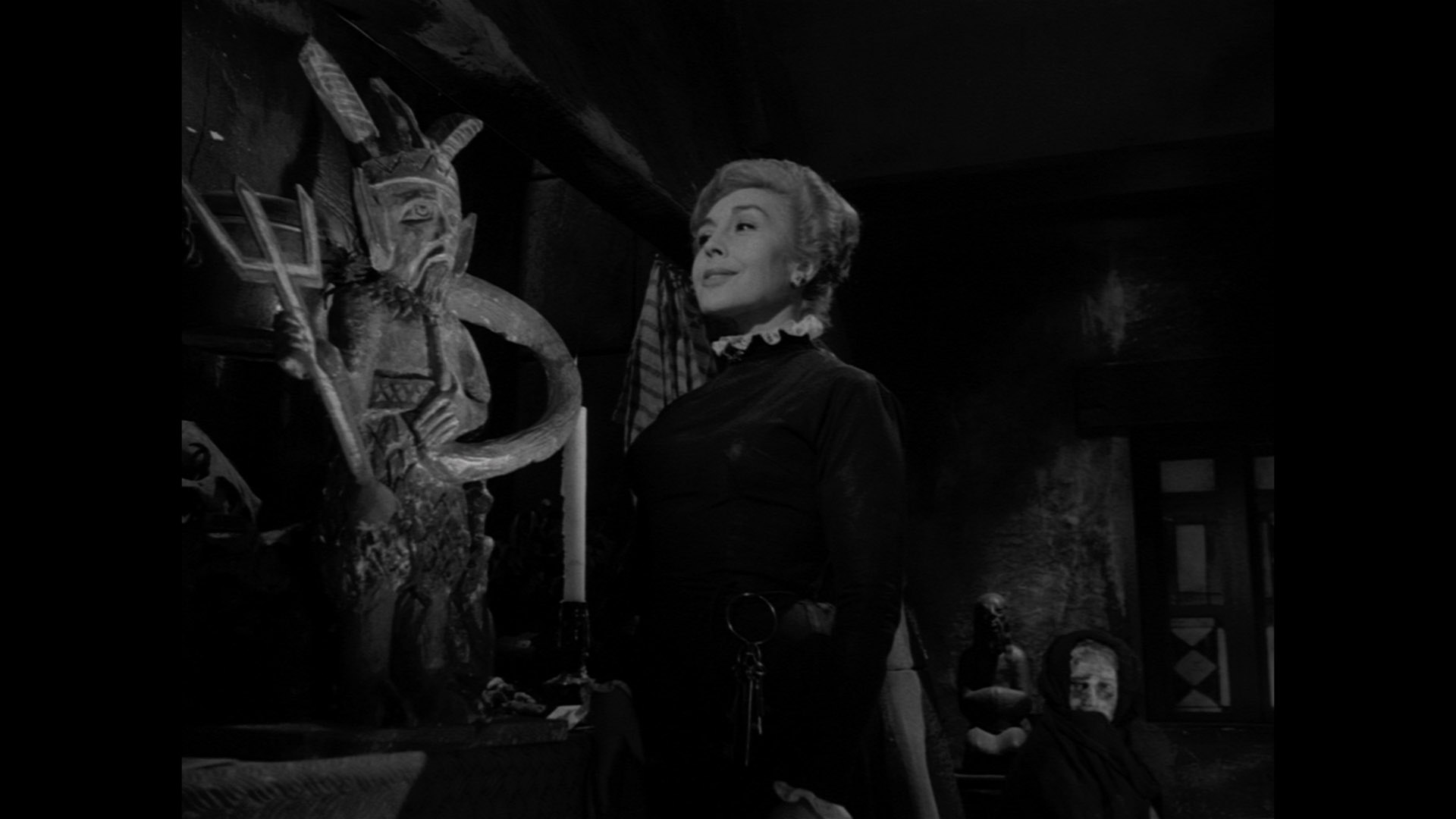 included are the subtitled Spanish theatrical trailer and a 42-image gallery of photos and publicity
included are the subtitled Spanish theatrical trailer and a 42-image gallery of photos and publicity 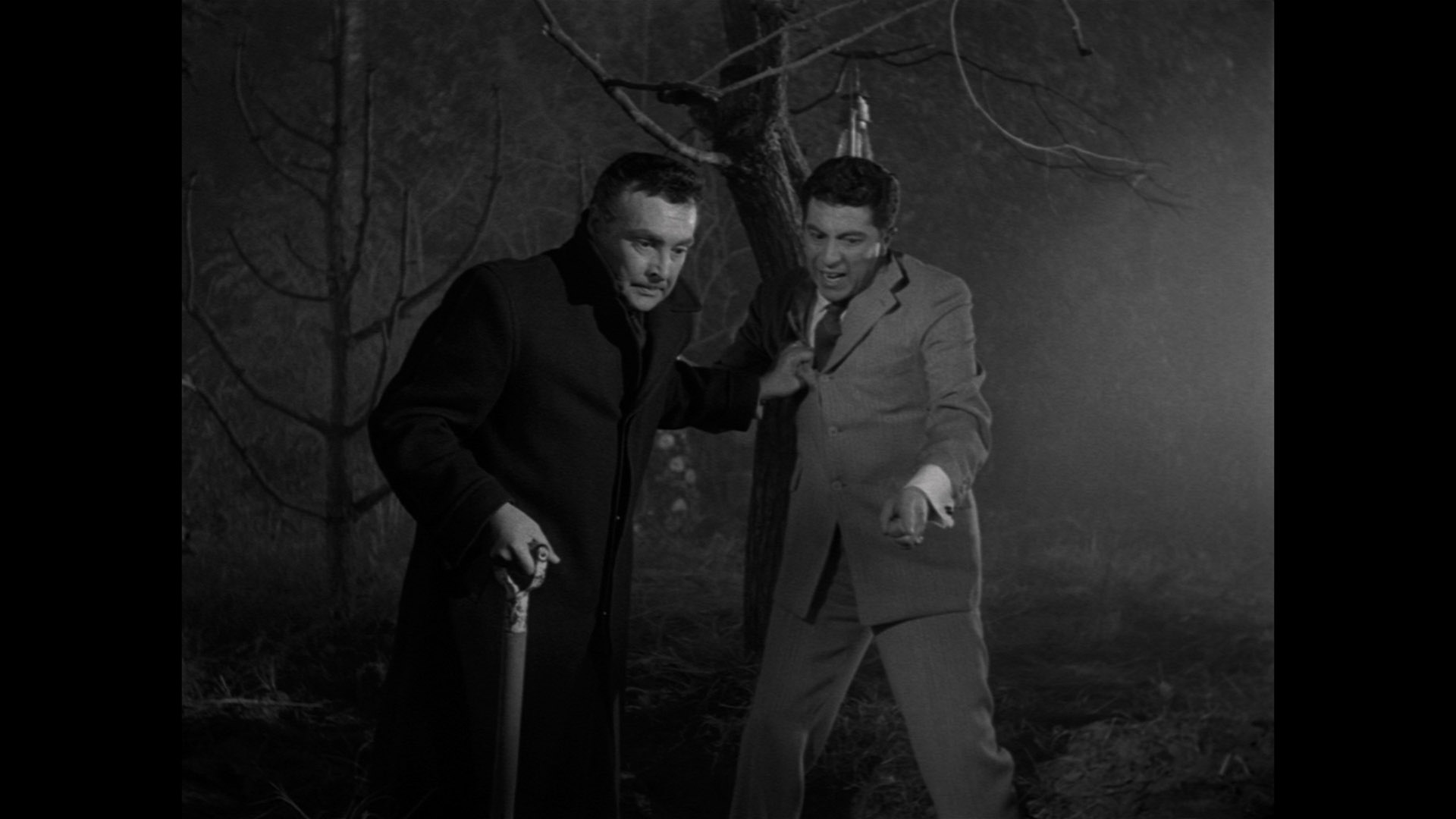 material.
material.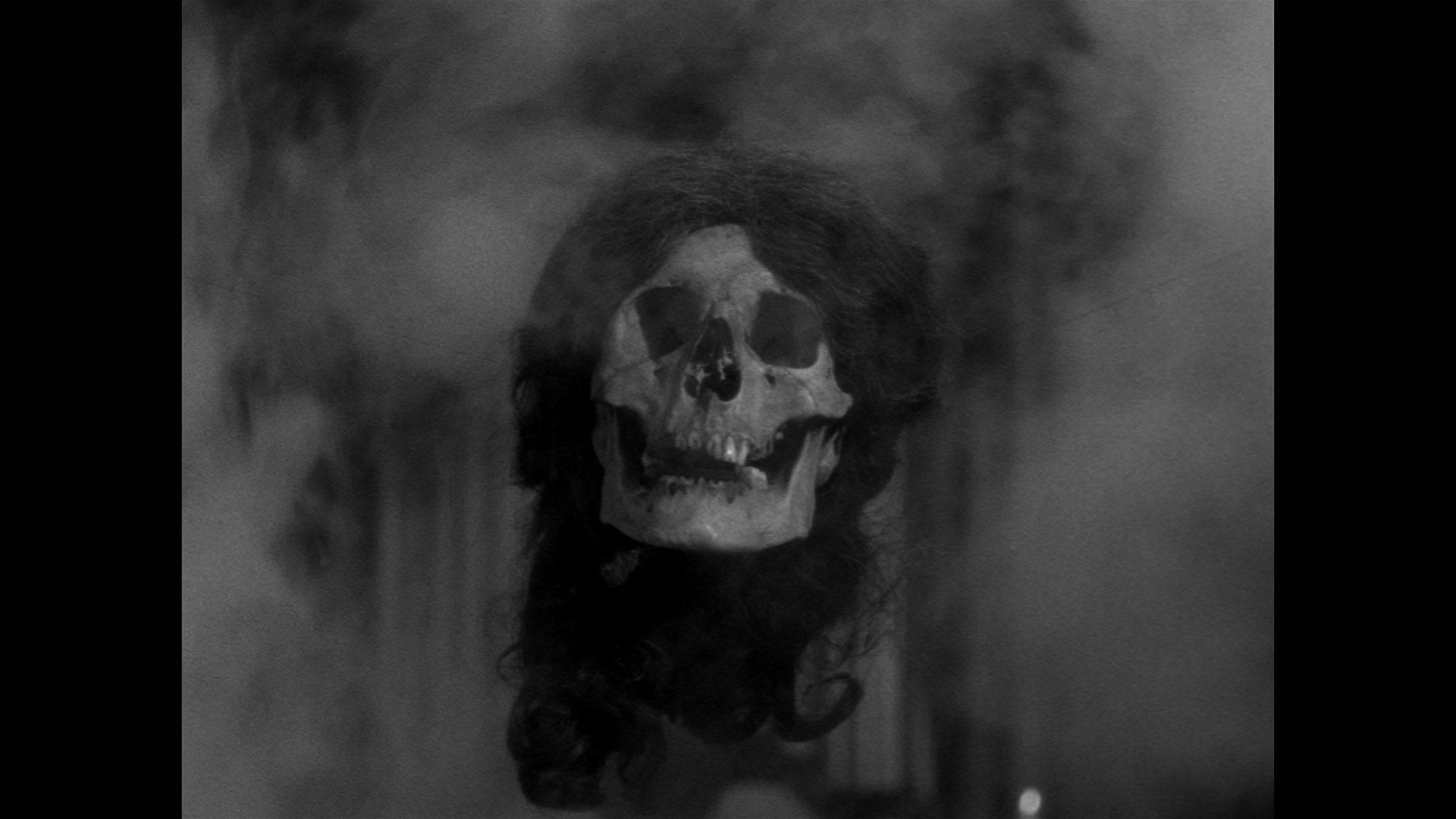 variation of Eyes without a Face (or The Awful Dr. Orlof if you prefer) with some splashes of The Hands of Orlac and The
variation of Eyes without a Face (or The Awful Dr. Orlof if you prefer) with some splashes of The Hands of Orlac and The 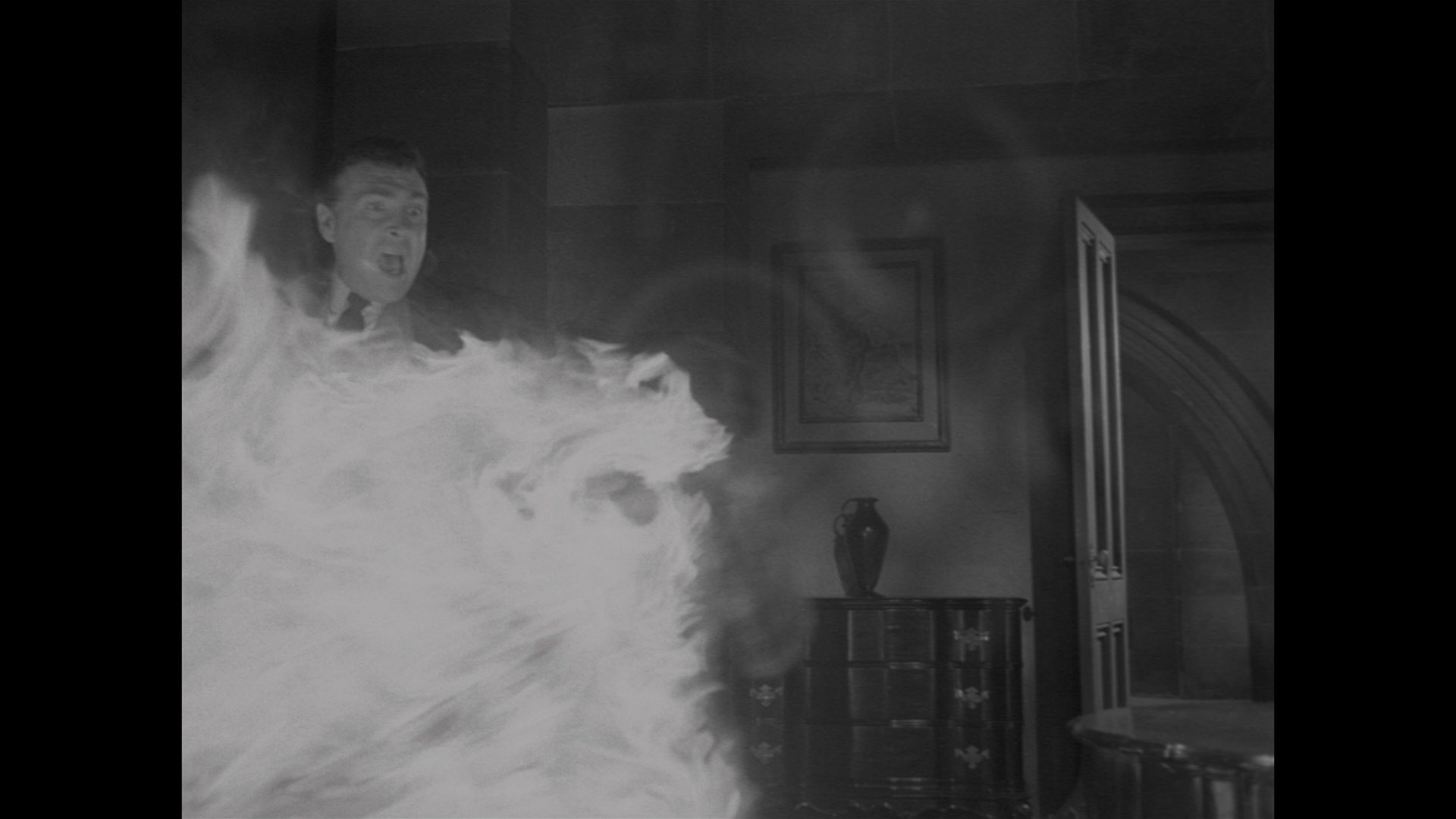 Beast with Five Fingers for good measure. Despite the title, the mirror is only of occasional significance within the story and, despite her avowed allegiance to regents of hell like Lucifuge and Satanachia, she isn't portrayed as the primary villain (despite her illogical determination to repeatedly inflict harm on Deborah). Mostly it's an evil husband amuck story, especially once he resorts to grisly means to help his wife including some impressive surgery gags that must have had TV watchers stopping in their tracks back in the day. The film's impressive visuals don't extend to all of the effects since a couple of disembodied hand bits at the end are outrageously sloppy, but otherwise it's a stylish and hugely enjoyable chiller perfect for late-night viewing.
Beast with Five Fingers for good measure. Despite the title, the mirror is only of occasional significance within the story and, despite her avowed allegiance to regents of hell like Lucifuge and Satanachia, she isn't portrayed as the primary villain (despite her illogical determination to repeatedly inflict harm on Deborah). Mostly it's an evil husband amuck story, especially once he resorts to grisly means to help his wife including some impressive surgery gags that must have had TV watchers stopping in their tracks back in the day. The film's impressive visuals don't extend to all of the effects since a couple of disembodied hand bits at the end are outrageously sloppy, but otherwise it's a stylish and hugely enjoyable chiller perfect for late-night viewing.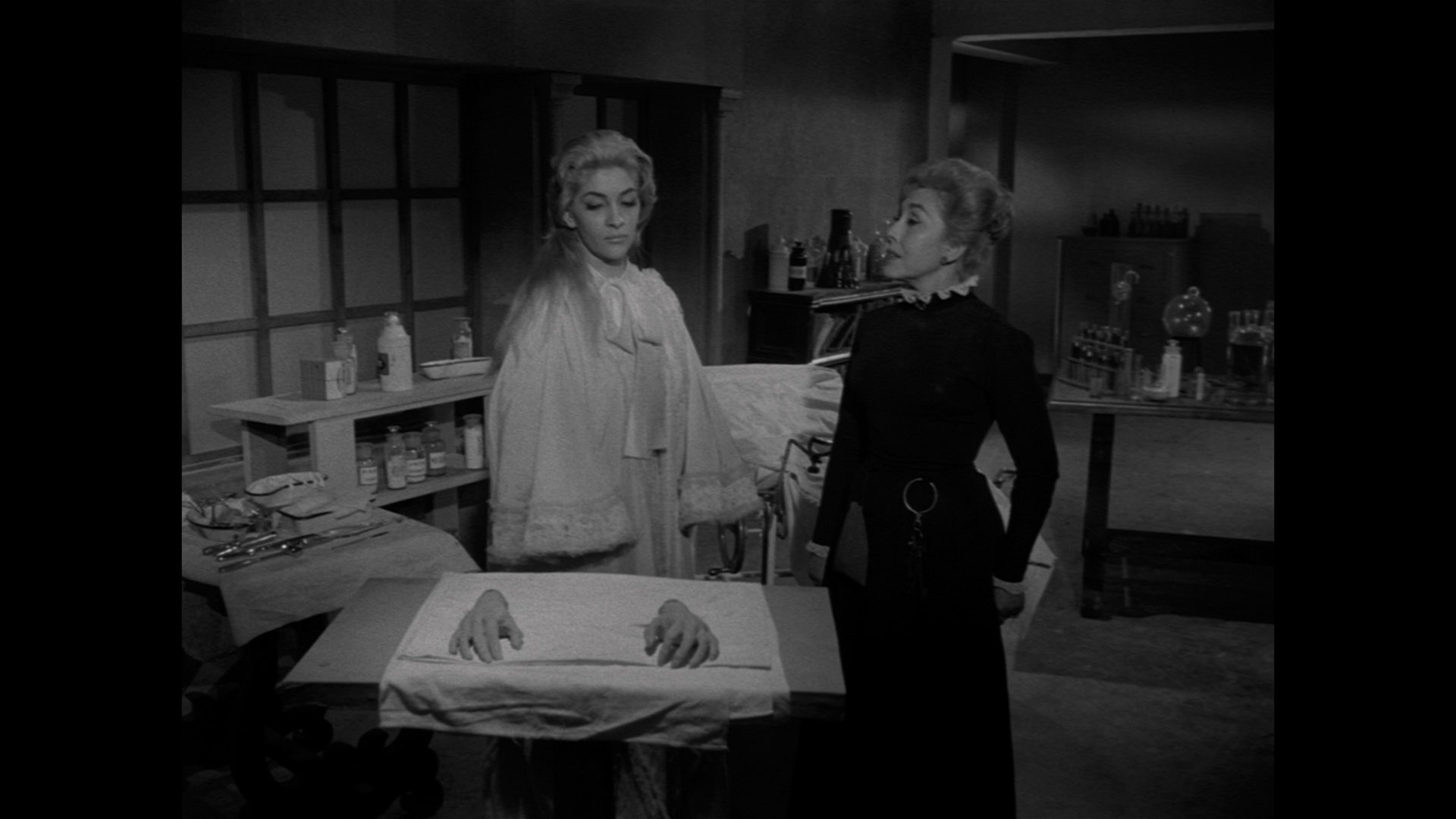 CasaNegra disc was a revelation at the time, featuring the Spanish-language version with English subtitles as well as the (not bad) English dub track along with a Frank Coleman commentary, a text essay about director Chano Urueta (another big titan in the realm of
CasaNegra disc was a revelation at the time, featuring the Spanish-language version with English subtitles as well as the (not bad) English dub track along with a Frank Coleman commentary, a text essay about director Chano Urueta (another big titan in the realm of 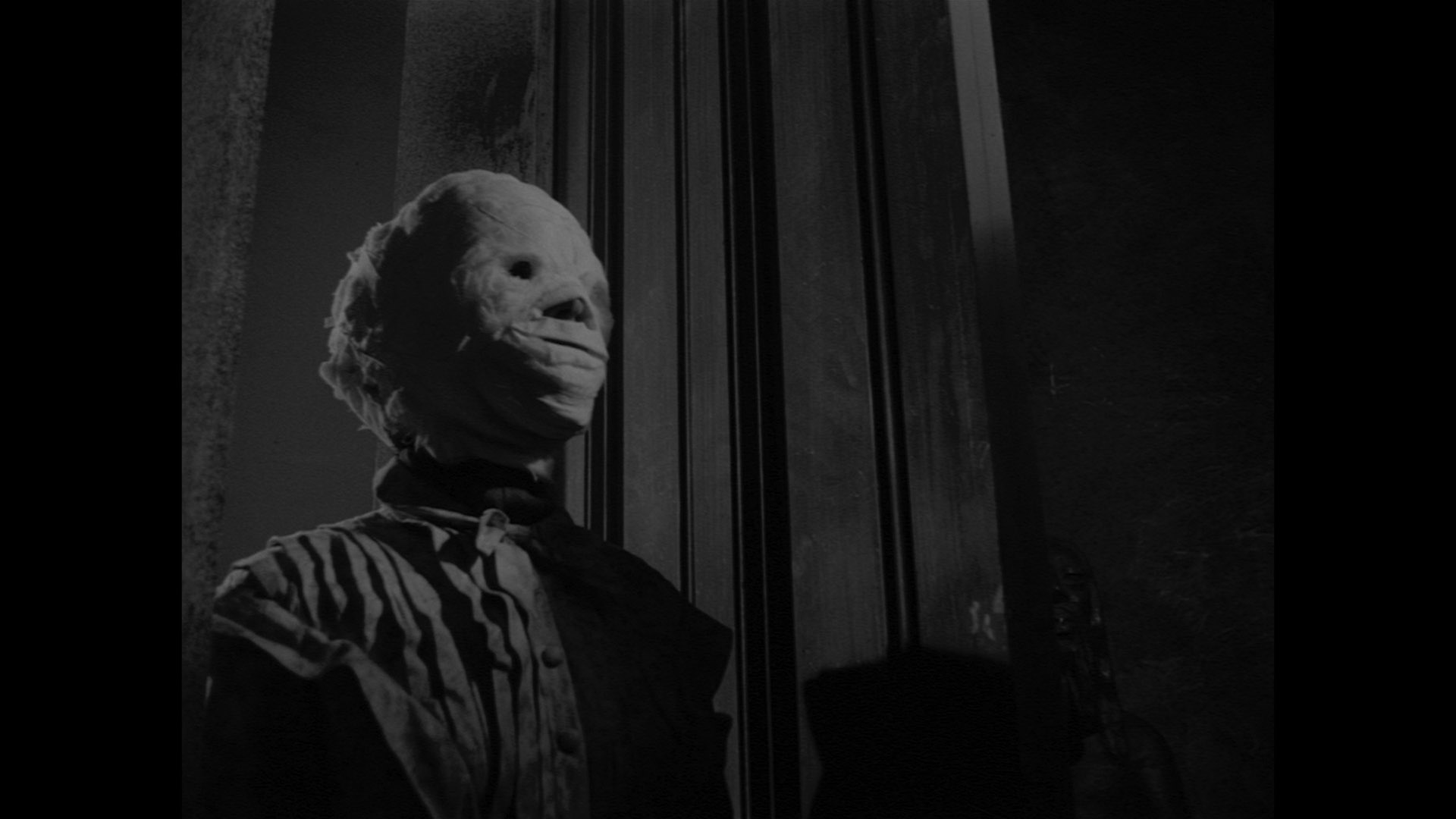 Mexican horror), cast bios, and a poster and stills gallery. The Indicator is a big step up in this case on the quality front, correcting the overly bright and contrasty look of the DVD and restoring the darker, moodier look of the film. Both the original Spanish and English-dubbed tracks are here in fine LPCM 1.0 mono versions with optional English-translated or English SDH subtitles, and Wilt appears here for a new commentary going into detail about his experiences watching the film over the years, the notable achievements of the actors, various Euro horror influences, relevant Mexican fantastic films, and more. Arenas appears for a 2022 Q&A (13m8s) at the Academy Museum in L.A. (as part of an exhaustive Mexican horror retrospective) speaking with programmer Abraham Castillo Flores, who translates between Mexican and English about her reluctance to watch herself on screen, her vivid memories of shooting the fire sequence, and thoughts on her director. The classic Mexican horror episode of the 2001 TV series Mondo Macabro (24m34s) created by Pete Tombs and Andy Starke is included here, split between a look at these Mexican horror films, the Santo films, and later gems like Alucarda. Also included are the Spanish theatrical trailer and
Mexican horror), cast bios, and a poster and stills gallery. The Indicator is a big step up in this case on the quality front, correcting the overly bright and contrasty look of the DVD and restoring the darker, moodier look of the film. Both the original Spanish and English-dubbed tracks are here in fine LPCM 1.0 mono versions with optional English-translated or English SDH subtitles, and Wilt appears here for a new commentary going into detail about his experiences watching the film over the years, the notable achievements of the actors, various Euro horror influences, relevant Mexican fantastic films, and more. Arenas appears for a 2022 Q&A (13m8s) at the Academy Museum in L.A. (as part of an exhaustive Mexican horror retrospective) speaking with programmer Abraham Castillo Flores, who translates between Mexican and English about her reluctance to watch herself on screen, her vivid memories of shooting the fire sequence, and thoughts on her director. The classic Mexican horror episode of the 2001 TV series Mondo Macabro (24m34s) created by Pete Tombs and Andy Starke is included here, split between a look at these Mexican horror films, the Santo films, and later gems like Alucarda. Also included are the Spanish theatrical trailer and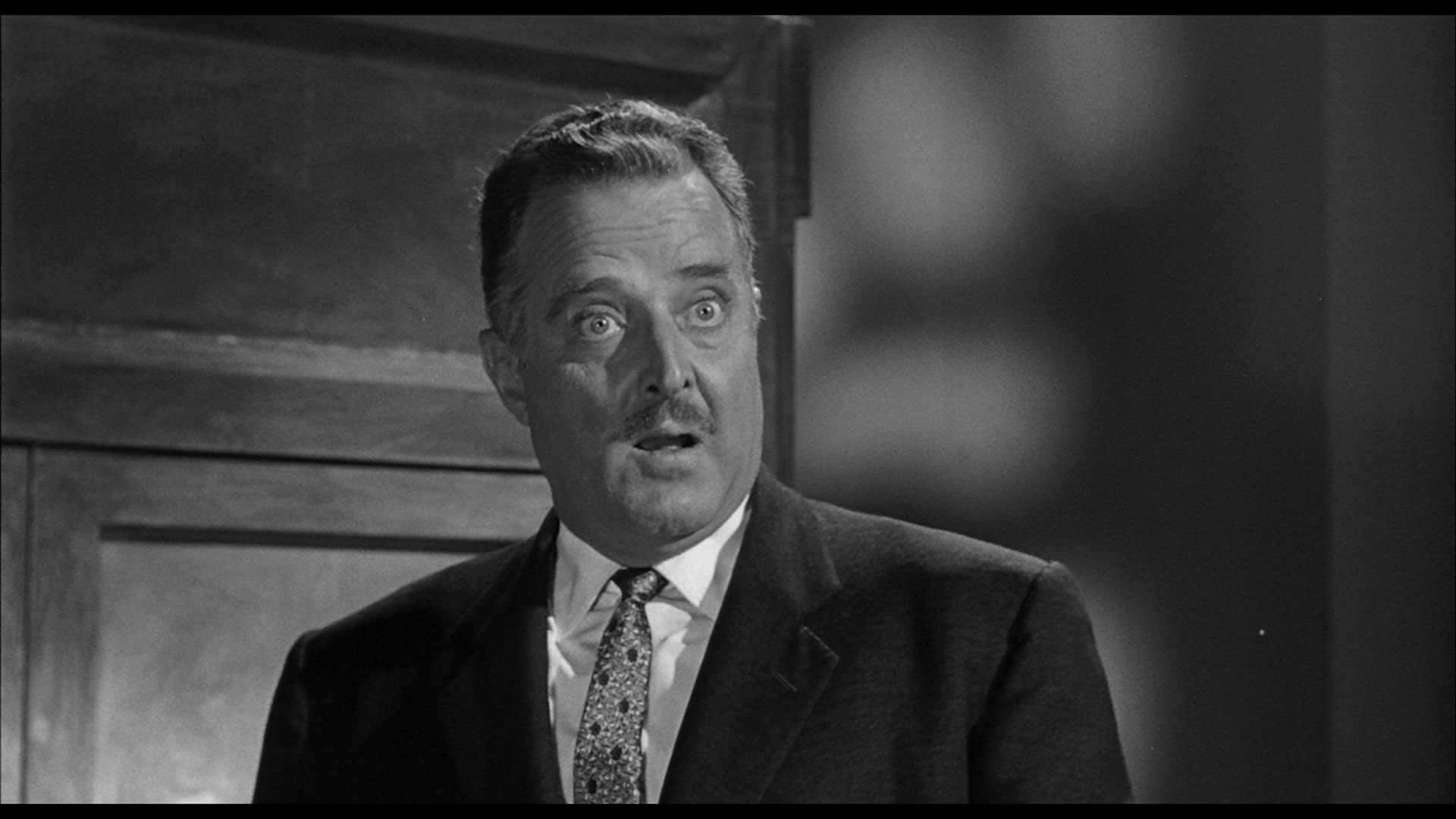 a 21-image poster and
a 21-image poster and 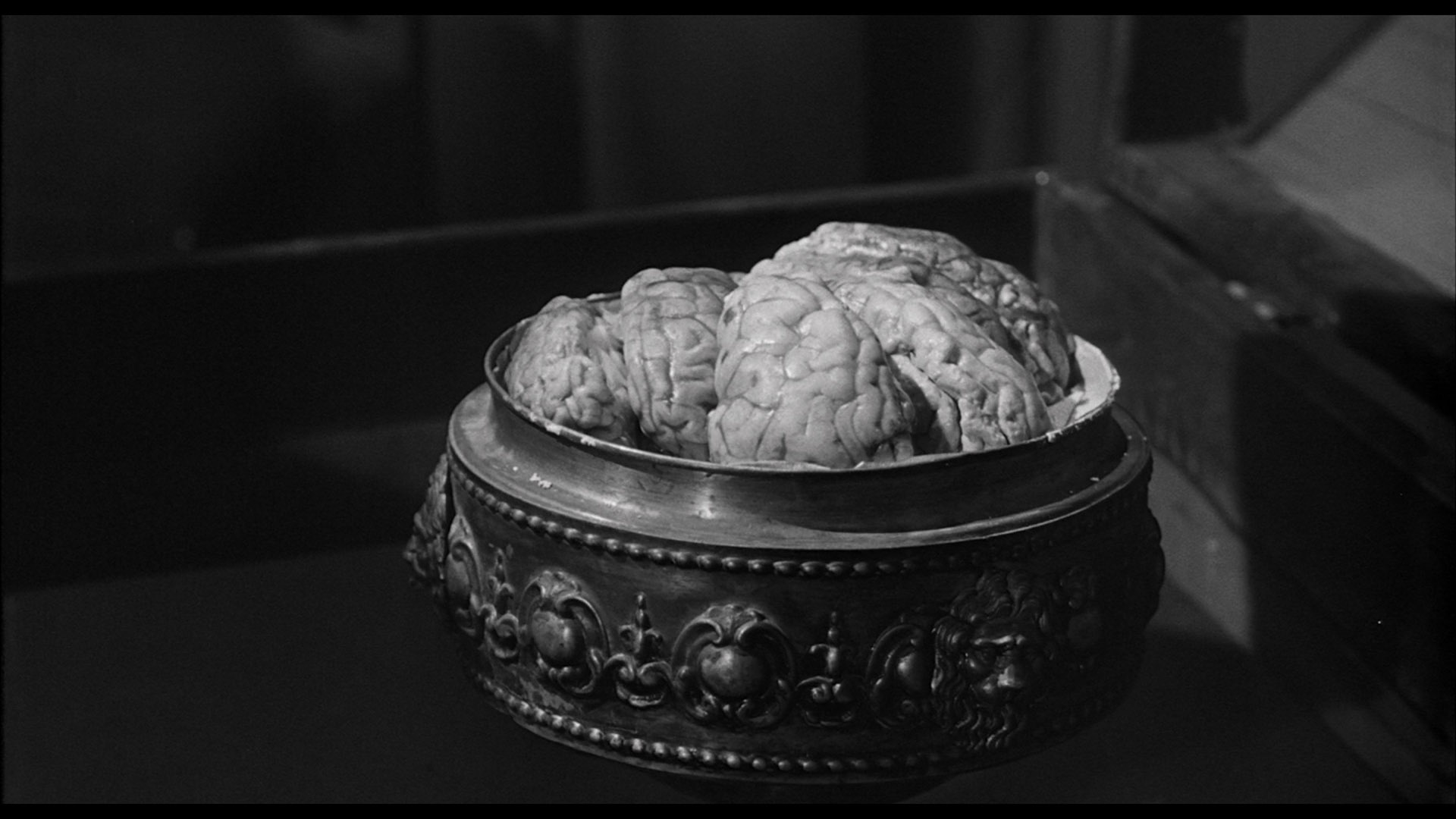 photo gallery.
photo gallery.  upon hitting the earth, unleashes the title creature, a hairy, clawed, big-headed incarnation of Vitelius capable of rendering itself invisible and sucking out the brains of hapless victims. In a human disguise, Vitelius holds chic dinner parties for his
upon hitting the earth, unleashes the title creature, a hairy, clawed, big-headed incarnation of Vitelius capable of rendering itself invisible and sucking out the brains of hapless victims. In a human disguise, Vitelius holds chic dinner parties for his 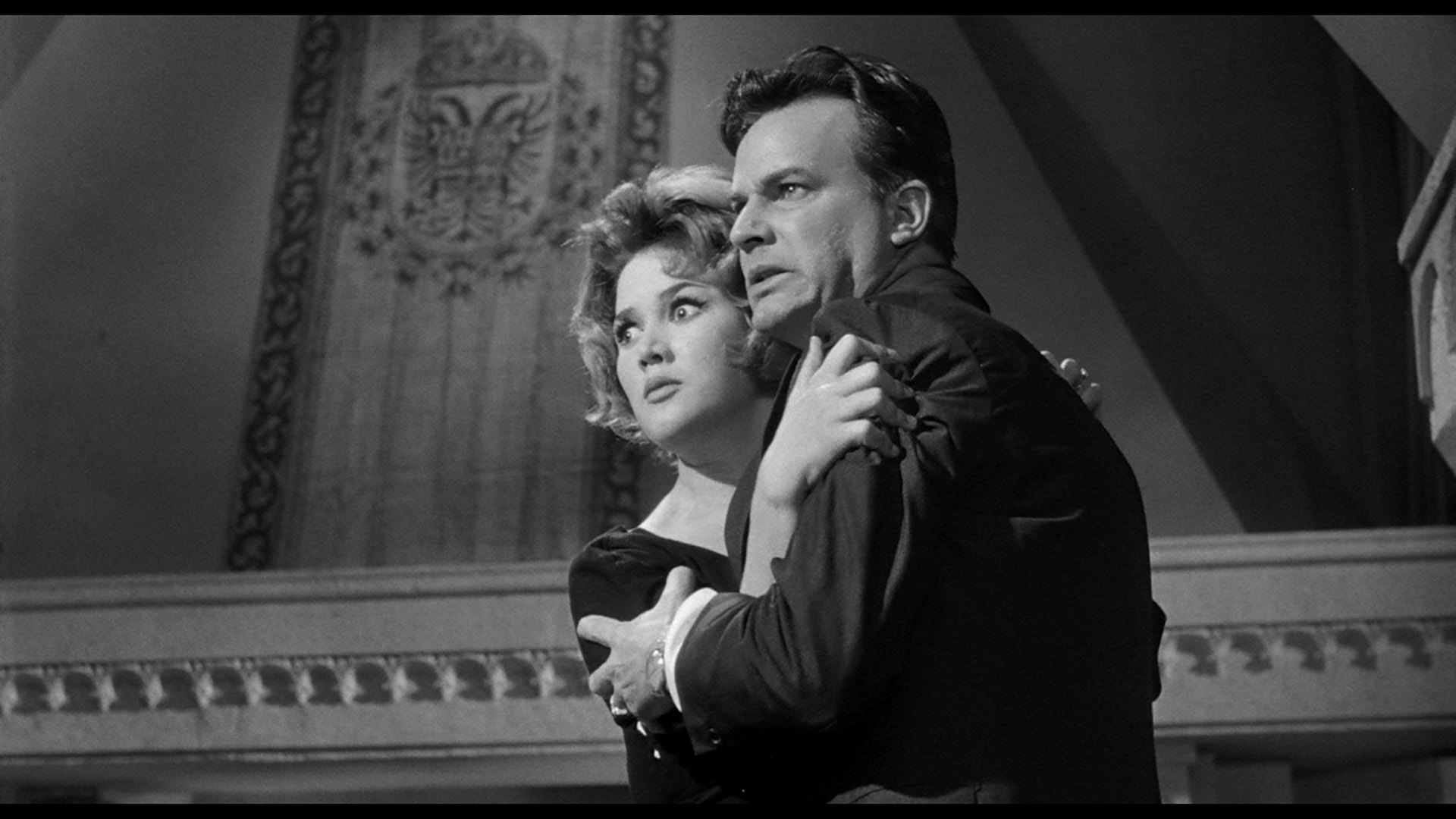 potential victims, then transforms into his natural state every now and then to extract their brains via his fork-shaped tongue. Naturally he also stashes away some of the leftover brains in a fancy bowl for later feedings, a practice his servants somehow fail to notice. The flaky Professor Milan (Aragón), along with Ronald (Silva) and Vicky (Welter), tries to solve the mystery of the Baron's return while people keep dropping like flies with little interference from the dim-witted police.
potential victims, then transforms into his natural state every now and then to extract their brains via his fork-shaped tongue. Naturally he also stashes away some of the leftover brains in a fancy bowl for later feedings, a practice his servants somehow fail to notice. The flaky Professor Milan (Aragón), along with Ronald (Silva) and Vicky (Welter), tries to solve the mystery of the Baron's return while people keep dropping like flies with little interference from the dim-witted police.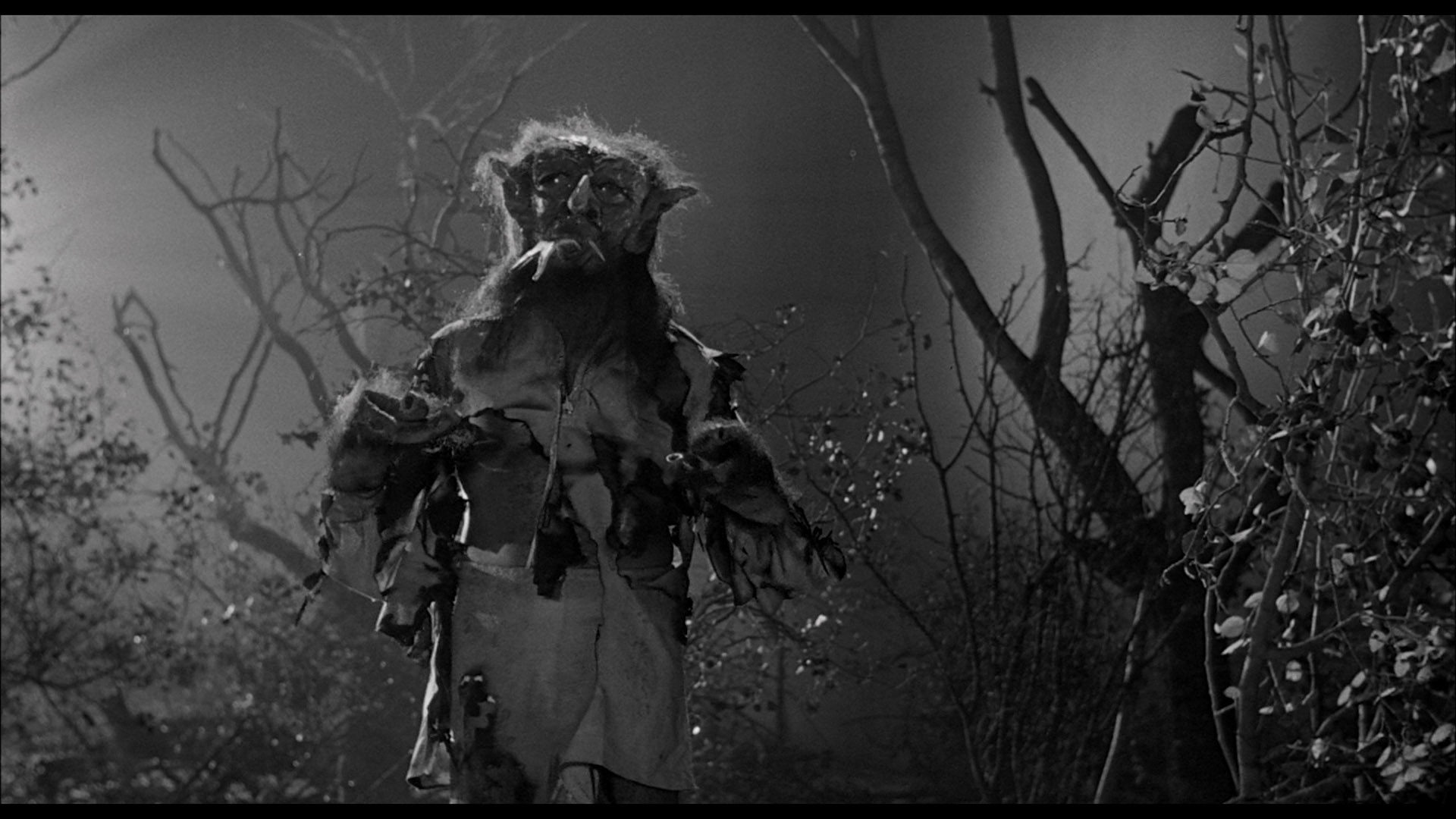 DVD has both the subtitled Spanish and English-dubbed tracks, an audio commentary by Kirb Pheeler, an essay by
DVD has both the subtitled Spanish and English-dubbed tracks, an audio commentary by Kirb Pheeler, an essay by 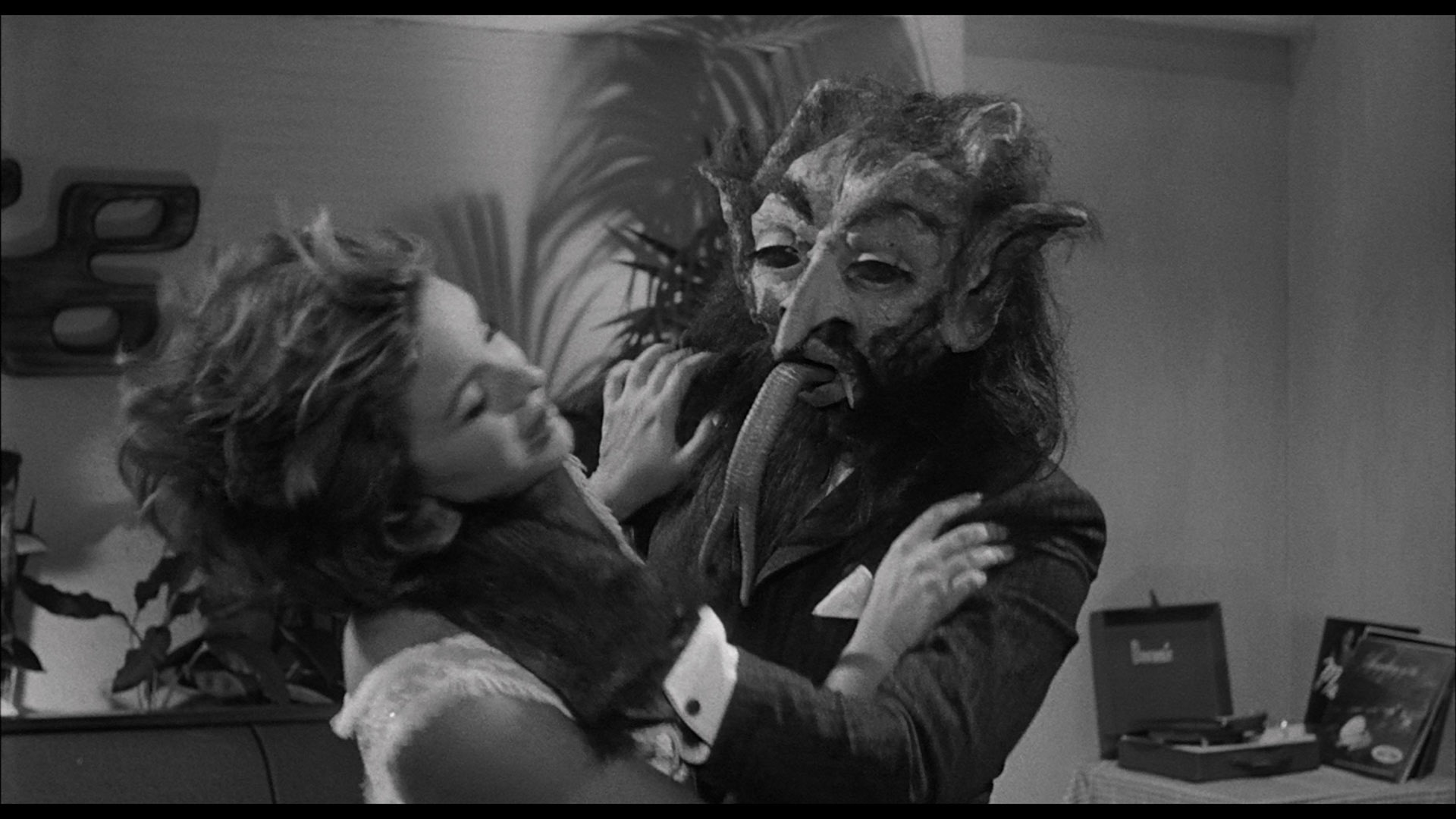 Casairo Buenavista ("Keep Repeating, It's Only the Most Bizzare [sic] Horror Movie Ever Made"), an interactive press kit, a 1969 U.S. theatrical radio spot, cast bios, and a gallery.
Casairo Buenavista ("Keep Repeating, It's Only the Most Bizzare [sic] Horror Movie Ever Made"), an interactive press kit, a 1969 U.S. theatrical radio spot, cast bios, and a gallery.  and a 36-image fotovela (with accompanying English translation) mixing artwork with stylized photos to
and a 36-image fotovela (with accompanying English translation) mixing artwork with stylized photos to 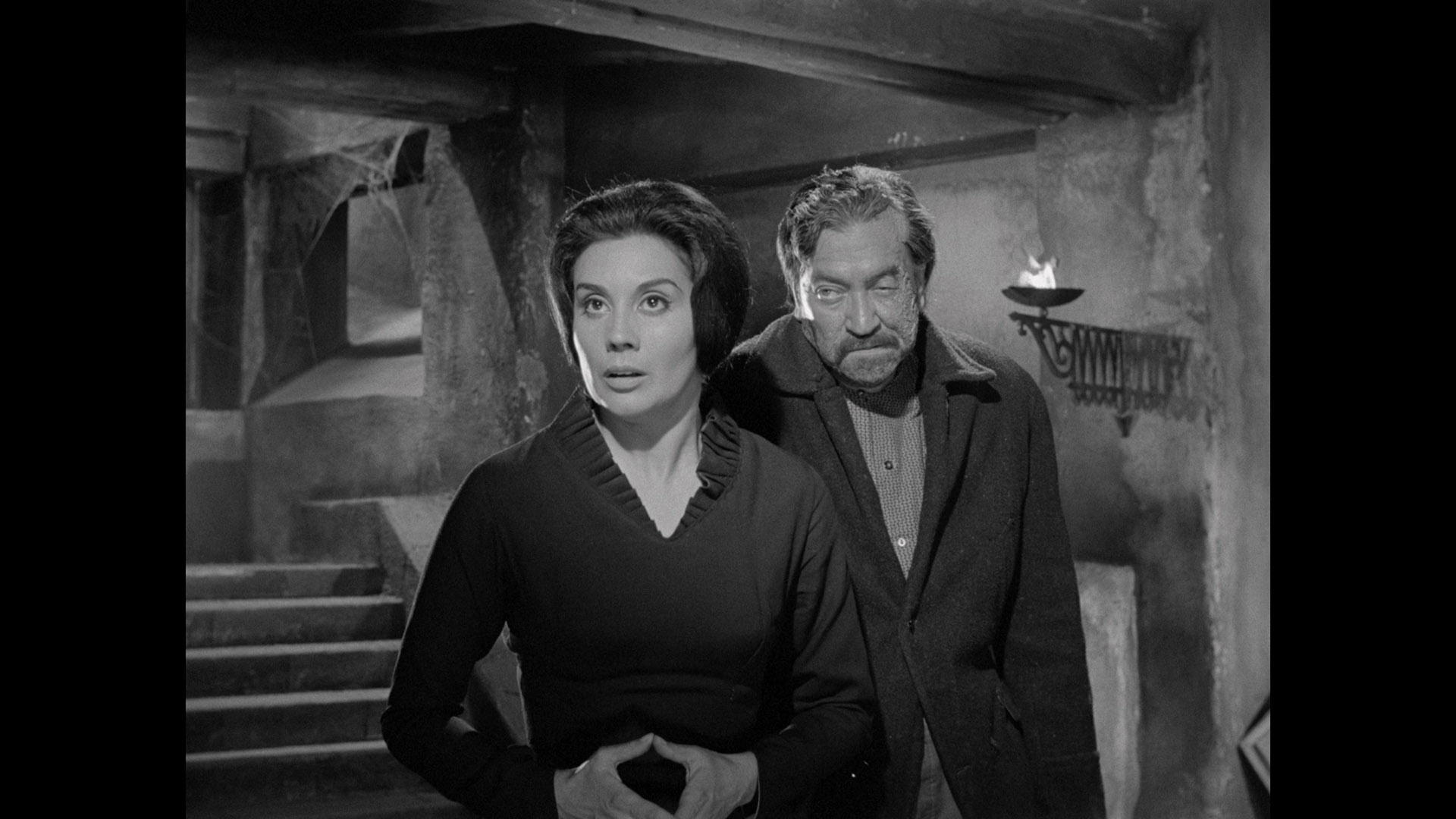 tell part of the film's story.
tell part of the film's story.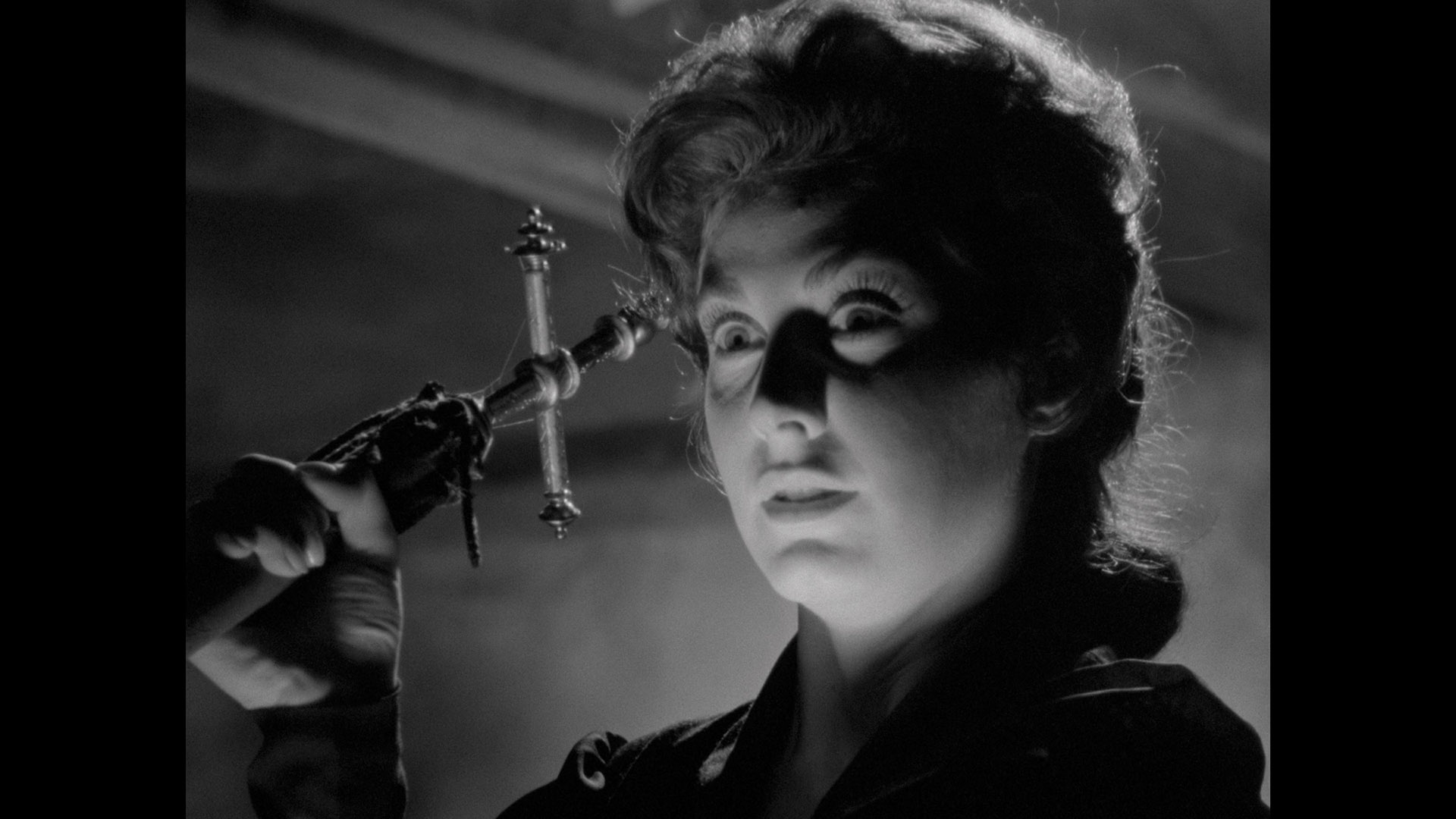 giving it their all. That said, the real star here is Macedo whose striking presence makes for a very memorable antagonist. The effects are handled well here as well including some fun mirror tricks, sequences in negative, and other flourishes to keep it all flavorful.
giving it their all. That said, the real star here is Macedo whose striking presence makes for a very memorable antagonist. The effects are handled well here as well including some fun mirror tricks, sequences in negative, and other flourishes to keep it all flavorful.  It doesn't shy away from the gruesome stuff either including a vicious dog attack that was too much for U.S. distributors at the time. Director Rafael Baledón was better known for his melodramas and westerns than his horror output, but he has a sure hand here including some wild touches like a sea of disembodied eyes surrounding Macedo at one point.
It doesn't shy away from the gruesome stuff either including a vicious dog attack that was too much for U.S. distributors at the time. Director Rafael Baledón was better known for his melodramas and westerns than his horror output, but he has a sure hand here including some wild touches like a sea of disembodied eyes surrounding Macedo at one point. 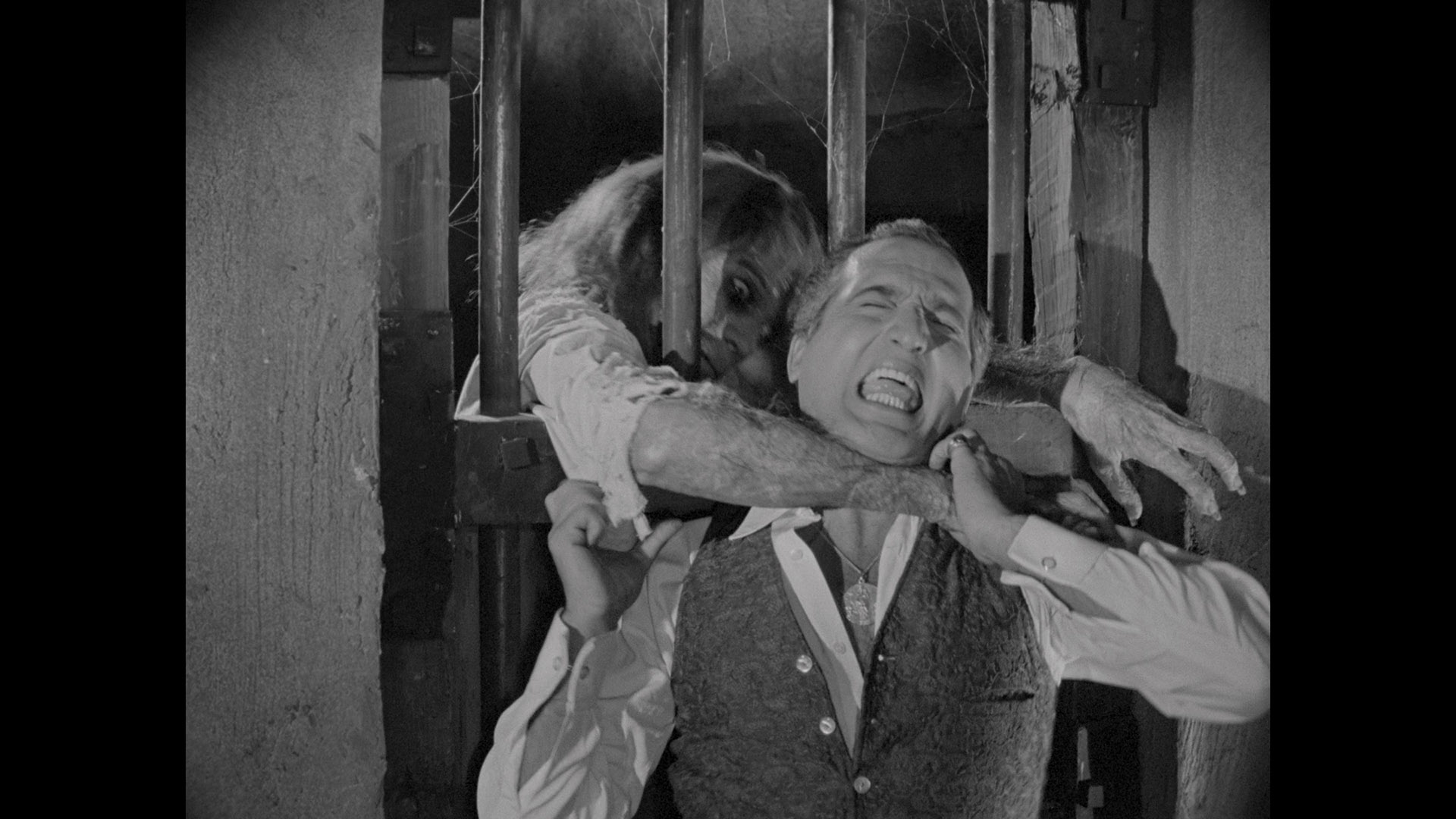 predation within the storyline. In "The Daughters of La Llorona" (25m36s):
predation within the storyline. In "The Daughters of La Llorona" (25m36s): 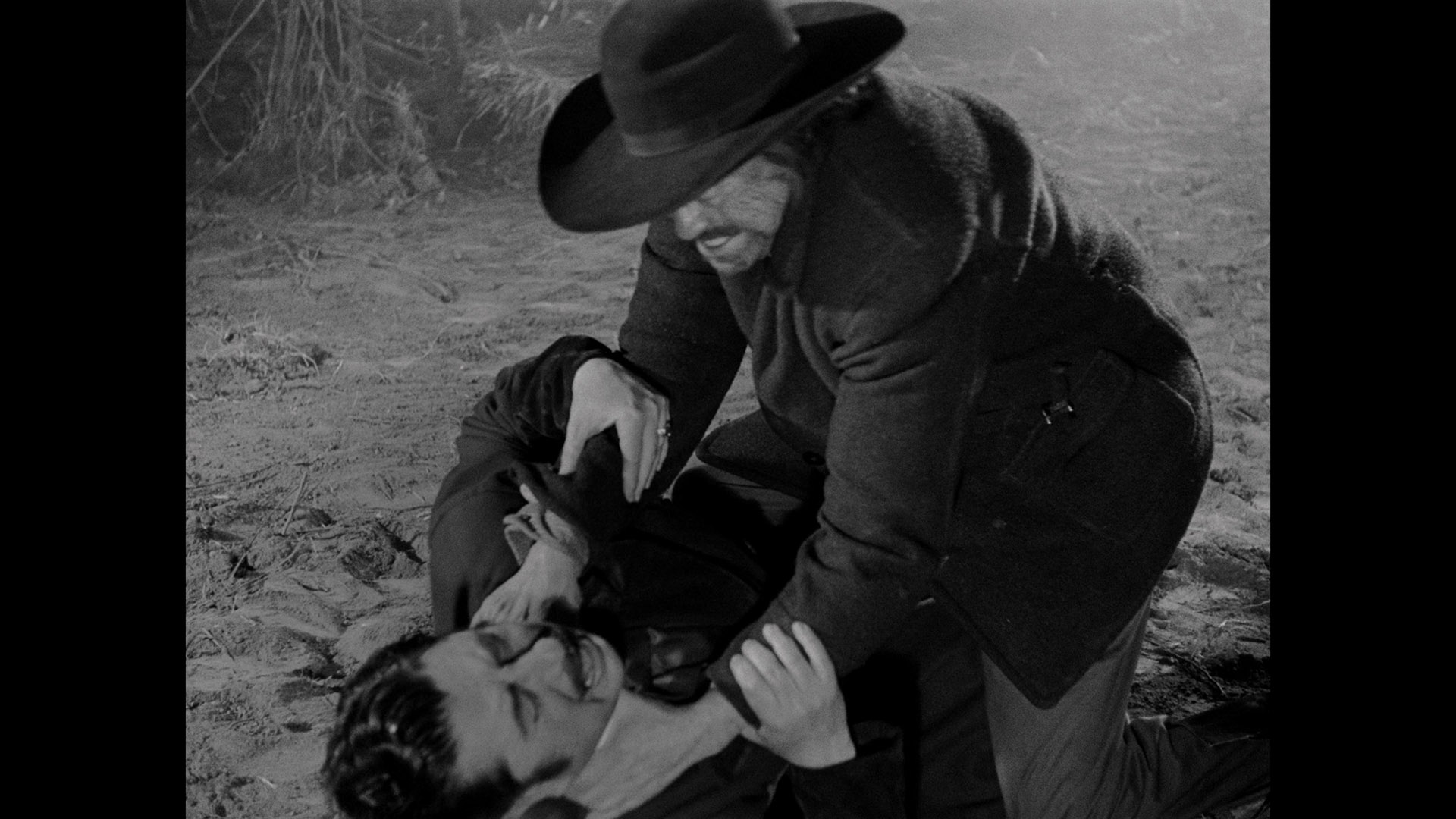 actor, producer and singer Julissa de Llano Macedo and author Cecilia Fuentes Macedo remember the peculiar relationship they had with their mother ("a crazy woman, very imposing"), Mexican screen icon Rita Macedo, including memories of meeting Boris Karloff during his Mexican horror period and their mother's significant achievements in the fashion world. "Daydreams and Nightmares" (17m43s) features author Eduardo de la Vega Alfaro discussing the career of Baledón including his many hats as an actor, writer, producer, and director, with some noteworthy titles pointed out and an argument against the so-called "quickies" in his filmography. Finally the disc wraps up with the Spanish trailer (which pushes this as a much more traditional Llorna story) and a 25-image gallery of stills, lobby cards, and ad art. The limited edition package also comes with a set of five art cards and a 100-page book featuring new essays by José Luis Ortega Torres, Wilt and Flores, an archival essay by Andrew Syder and Dolores Tierney, an obituary of Abel Salazar, and film credits.
actor, producer and singer Julissa de Llano Macedo and author Cecilia Fuentes Macedo remember the peculiar relationship they had with their mother ("a crazy woman, very imposing"), Mexican screen icon Rita Macedo, including memories of meeting Boris Karloff during his Mexican horror period and their mother's significant achievements in the fashion world. "Daydreams and Nightmares" (17m43s) features author Eduardo de la Vega Alfaro discussing the career of Baledón including his many hats as an actor, writer, producer, and director, with some noteworthy titles pointed out and an argument against the so-called "quickies" in his filmography. Finally the disc wraps up with the Spanish trailer (which pushes this as a much more traditional Llorna story) and a 25-image gallery of stills, lobby cards, and ad art. The limited edition package also comes with a set of five art cards and a 100-page book featuring new essays by José Luis Ortega Torres, Wilt and Flores, an archival essay by Andrew Syder and Dolores Tierney, an obituary of Abel Salazar, and film credits.BLACK PIT OF DR. M: Indicator (Blu-ray)
BLACK PIT OF DR. M: Casa Negra (DVD)
THE WITCH'S MIRROR: Indicator (Blu-ray)
THE WITCH'S MIRROR: Casa Negra (DVD)
THE BRAINIAC: Indicator (Blu-ray)
THE BRAINIAC: Casa Negra (DVD)
THE CURSE OF THE CRYING WOMAN: Indicator (Blu-ray)
THE CURSE OF THE CRYING WOMAN: Casa Negra (DVD)
![]()